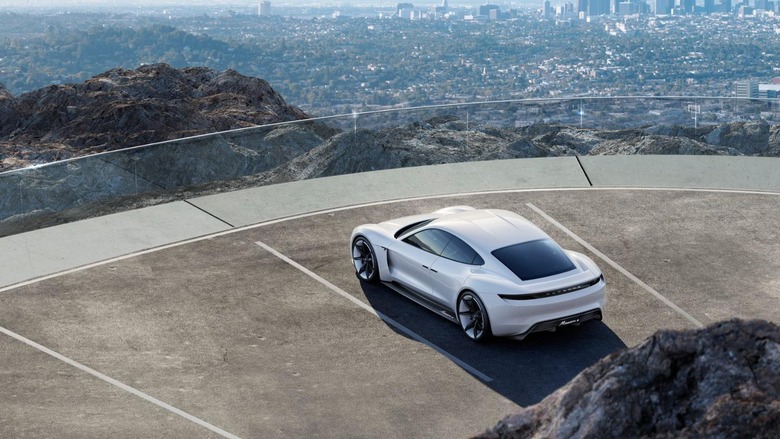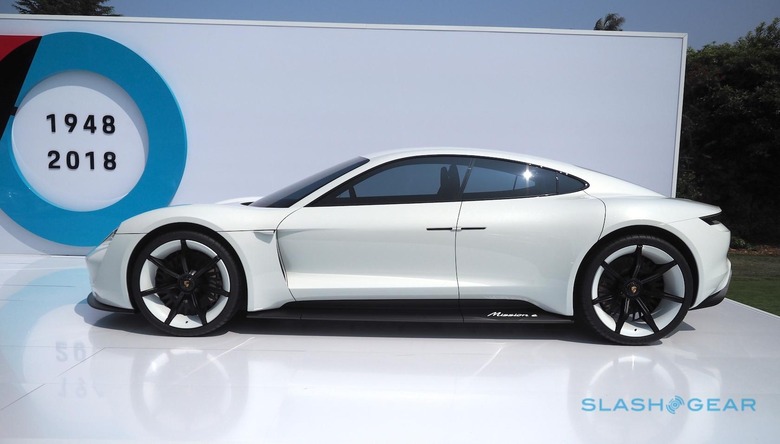Porsche's Taycan is almost here - this is why I'm excited
It feels like the Porsche Taycan has been a long time coming. Four years after the German automaker revealed its Mission E concept, the first all-electric sedan from the company better known for the 911 is about to make its public debut, and with it drop a huge bombshell in the EV segment.
Unveiled in September 2015, the Mission E was a fairly obvious – and heavy – hint at what Porsche had in mind for an electrified world generally defined by Tesla. Clearly related to the automaker's internal combustion cars visually, yet promising a cutting-edge 800 volt power system, the Mission E found a more positive reception than even Porsche could've hoped for.

It didn't take long – less than two months, in fact – for the company's execs to green light a production version. Then, of course, the hard work translating a concept car to something you could actually walk into a dealership and buy began. It wasn't until mid-2018 that the Taycan badge – the name a rough equivalent to the Turkish for "lively young horse" – was attached.
Since then Tesla has released the Model 3, and the Model S has received numerous performance and other upgrades. We've seen Jaguar's shapely and spritely I-PACE crossover arrive at dealerships, and more recently Audi's e-tron SUV offer a distinctly familiar driving experience that just so happens to be electric. More EVs, from a variety of manufacturers, are waiting in the wings.
The Taycan hype, then, could easily have started to wane. Something still of interest to Porsche fans – at least, those willing to acknowledge a car without a straight-six under the sheet metal – but its potential impact diluted by a gradually maturing electric vehicle market. That it hasn't speaks volumes.
Porsche apparently has more than 30,000 paid reservations for the Taycan worldwide. So fierce has demand been – before, even, final specifications or even a price has been confirmed – the automaker has had to preemptively increase production. Meanwhile a series of performance demonstrations, some serious and others a little sillier, have continued to stoke the pre-reveal fires.
What's particularly curious is that, while Porsche has played the key details close to its chest and won't be confirming things like exact power, speed, and range until tomorrow's big unveil, interest remains high. Barring an unexpected miracle, it still seems almost certain that the Model S will best the Taycan on how far it can drive on a full charge. With Ludicrous mode active, it wouldn't be a surprise if Tesla's sedan is a little faster, too.
Even the Taycan's much-vaunted 800V power system and high-speed charging will only really be useful if you can find a suitably high-power charger. Even with VW Group's vast heapings of investment into Electrify America, that network is still fledgling at best. The majority of Taycan charging will, like is the case with all EVs, be done at home or at the office, on a far more mundane connection.
Why, then, does interest remain so high? Porsche's reputation for performance cars is one key element, naturally. The Model S could always go fast in a straight line, for instance, but it's only recently with its latest air suspension system that the weighty EV held up in the corners as well. If Porsche can grant the Taycan some of the 911's poise when things get curvy, even if it's not as powerful it could still prove to be more the driver's car.
Then there's badge prestige, and matters of reliability and reassurance. For every Tesla fan with nothing but praise for the company, it can seem like there's another owner with an after-sales nightmare to report. The automaker has invested more in servicing of late, but it's still some way from the white-glove treatment Porsche drivers have come to expect from their dealers. That alone may be sufficient to sway some sales.

The reality, though, is that EVs are not a zero-sum game. While it can feel at times as though it's "Tesla versus the world" – a perspective Elon Musk hasn't been shy in fueling at points – there's plenty of space in the market for multiple strong cars. More choice is always going to be better: for potential owners looking for the best car to suit their needs; for manufacturers enjoying greater EV visibility; and for the environment as internal combustion's sales lead is gradually scraped away.
It feels like we're at a tipping point, with the Taycan at its vanguard. VW Group alone has a huge range of electric cars planned for the next few years; factor in the rest of the industry, both stalwarts and startups, and it's clear that the competition Elon Musk invited back in June 2014 is finally readying its arrival. The Porsche Taycan may not be the car for everybody when it emerges from under the covers on Wednesday morning, but don't worry: it's only the first new EV of many.
